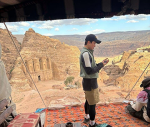The New Year saw the usual spate of cartoons about the departure of the old year and the arrival of 2014.
For Jordan, the New Year brought the start of the country’s two-year stint on the United Nations Security Council.
This role brings major new responsibilities. But what does it mean in practice?
What can Jordanians expect to see as their country grapples with the biggest security issues the modern world is facing? How can Jordan influence the council’s deliberations?
I suspect that many Jordanians are only aware of the council’s work when a resolution is adopted or a statement is issued. But a great deal happens in between the big decisions.
While no country can dictate the outcome of the council’s work, the Jordanian delegation’s contribution to the council’s day-to-day exchanges and negotiations will be important.
As is well known, the council has 15 members, five of which are “permanent”. The other 10 serve for two years; five are elected each year, selected so that each geographical region of the world is represented. Jordan was elected to represent the Asian region for the next two years.
What does the Security Council actually do?
Its main role is to maintain international peace and security. It was created — along with other UN institutions — in the aftermath of World War II, when the international community resolved that such wars should not happen again.
Unlike the General Assembly, on which all 193 members of the UN are represented, the Security Council can take decisions that are binding.
If the council assesses that there is a threat to world peace and security, it can take a range of actions such as imposing sanctions or referring individuals to the International Criminal Court.
Another measure that requires a Security Council decision is to deploy a peacekeeping force.
There are 15 peacekeeping operations round the world, many of them in Africa.
As one of the main contributors of troops and police, Jordan is well placed to participate in the discussions on peace keeping.
The council’s work is, of course, controversial. The use of the veto by the permanent members is especially open to criticism.
For example, there has been a lot of frustration about the inability of the council to adopt a strong resolution on Syria after three resolutions were vetoed by Russia and China in the last 3 years.
However, when the council does come together, it can deliver real value, such as the resolution which agreed to the destruction of Syria’s chemical weapons.
There is also a strong argument that the membership of the Security Council should be updated to reflect the fact that major powers like India, Japan and Germany, merit permanent membership.
The UK, as one of the permanent members, supports this process of reform, but agreement on the detail has been elusive.
Such controversy is a natural part of the dynamic of a large international organisation that seeks to represent the views of its members.
We are without doubt better off with the UN than without it. And if we did not have a body like the Security Council, we would want to invent it.
Discussion at international level is crucial. The world is even more interconnected and interdependent than when the UN was created in 1945 with 51 members.
Issues of peace and security have an impact across the world. So do the other big issues handled by the UN: environment, human rights and eradication of poverty.
For the Jordanian Ministry of Foreign Affairs and the Jordanian delegation in New York, membership of the Security Council comes at a fascinating time.
In the next two years, the world will continue to be a complex and fragile place. The threats to world peace and security, especially in the Middle East, will continue to require the attention of the council.
Even in January, when Jordan has the presidency of the council, the situation in Syria and the impact of the refugees on neighbouring countries, including Jordan, will be major issues.
As a close friend of Jordan, the UK very much welcomes Jordan’s membership in the Security Council.
We look forward to working closely together on the council’s challenging agenda ahead.
The writer is British ambassador to Jordan. He contributed this article to The Jordan Times.












